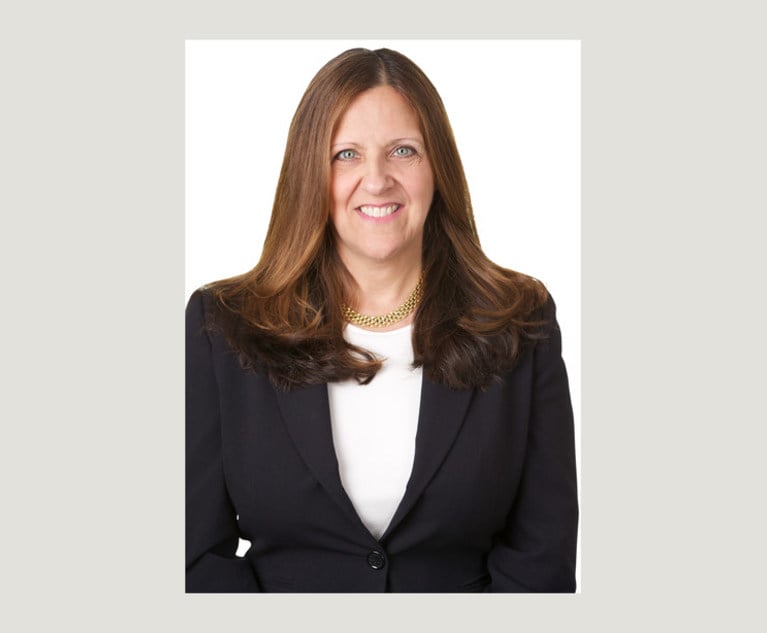 Getty Images/iStockphoto
Getty Images/iStockphotoUsing Ethics Rules in Malpractice Proceedings to Protect Confidential Intellectual Property
Applying RPC 1.9 (Duties to Former Clients) may make sense in a malpractice action because it can avoid disclosing confidential intellectual property information in open court.
January 08, 2020 at 01:30 PM
6 minute read
An internet firm hires an attorney to review its Google Ads account registration responses to help it secure internet advertising. The law firm uses the firm's confidential intellectual property information to do so. After the representation ends, the internet firm is repeatedly outbid for Google Ads by an internet competitor and thereby losing market share and revenue opportunities. The internet competitor is using the same attorney to review its Google Ads account registration responses as the internet firm. The internet firm is concerned that the attorney is using its information to help a rival, and wants to sue the attorney for malpractice, but does not want to expose its confidential intellectual property information in the process. The use of Rule of Professional Conduct may provide a solution.
The use of ethics rules in a malpractice proceeding is designed to prevent the law from requiring former clients form revealing confidential intellectual property information while dealing with attorneys who have misused said confidential intellectual property information. The use of ethics rules provides an alternative for a former client to providing direct proof that attorneys misused their confidential information, by disclosing the confidential intellectual property information that ethics rules are intended to shield.
The New Jersey rule and Model Rule of Professional Conduct 1.9(a) prohibits an attorney "who has formerly represented a client in a matter" from subsequently "represent[ing] another person in the same or a substantially related matter in which that person's interests are materially adverse to the interests of the former client." The application of this rule provides an option for the internet firm to prove the element of breach within the broader claim of breach of confidentiality, without specific disclosure of the firm's confidential intellectual property information.
Rule 1.9 allows the internet firm to bring a legal malpractice suit against its former attorney by alleging that the attorney breached confidentiality of the internet firm by showing the attorney misused its confidences (i.e., the internet firm's intellectual property information). As in the case of traditional violation of confidentiality matters, the internet firm would identify damages stemming from being out bid on Google Ads and associated lost market share and profits.
The elements of a breach of confidentiality action are: (1) the attorney had a duty not to misuse the confidential information of its former client; (2) the attorney breached that duty by misusing confidences; and (3) the breach caused the former client to suffer an injury. See Restatement (Second) of Torts §652H (Am. Law Inst. 1977). Traditionally, the internet firm should have to present proof that the law firm actually misused the firm's confidential intellectual property information, but by doing so the internet firm may be required to disclose the information it wants kept secret.
The concept of "substantial relationship between two matters" is commonly understood. In particular, two matters are substantially related when there is a "substantial risk" that the former client's confidential information would advance the new client's position. See In re American Airlines, 972 F.2d 605, 621-28 (5th Cir. 1992) (finding disqualification proper when law firm engaged in impermissible conflicts of interest in substantially related matters), cert. denied, Northwest Airlines v. American Airlines, 113 S. Ct. 1262 (1993).
Rather, the internet firm may convince a judge that a malpractice suit should be allowed by merely showing that the exact matter for which the internet firm hired the attorney in question is the "same or a substantially related matter in which that person's interests are materially adverse to the interests of the former client" (i.e., a violation of Rule 1.9). This finding may be in the form of a court's finding of a conclusive presumption that an attorney breach had occurred. For example, in Damron v. Herzog, 67 F.3d 211, the court found that common law requires a continuing duty owed by attorneys to former clients not to represent an interest adverse to a former client on a matter substantially related to the matter of engagement. When such a duty is breached, the former client may bring a cause of action at law.
It should be noted that Rule 1.9 provides the basis for three kinds of action adverse to the conflicted attorney: professional discipline, disqualification, and civil damages. See Restatement (Third) of the Laws Governing Lawyers, Section 132 (2000). Thus, Rule 1.9 directly allows a malpractice action in the form of a suit arising out of an attorney's violation of a confidentiality duty.
Due to the importance of the attorney-client confidence, courts are likely to allow rules that are favorable to the client to apply. Thus, a court may not require proof of the actual misuse of confidential intellectual property information, but rather the possibility of the breach of confidential intellectual property information can be determinative. In short, the public policy of protecting attorney-client confidence, combined with the risk of breach, may justify a conclusive presumption. Thus, the internet firm in this matter need not disclose confidential intellectual property information in order to result in a favorable malpractice result.
In short, the mere threat of disclosure may be enough to raise a presumption of breach. It should be noted, however, that the "substantial relationship" standard is not met every time an attorney has some knowledge of a former client's confidential information. However, it is most likely met when an attorney has access to information helpful to a former client's rival while performing identical services for the rival immediately after doing so for the former client. The fact that the mere "substantial relationship" standard is not met every time an attorney has some knowledge of a former client's confidential information protects attorneys from facing liability for a breach of confidentiality that never happened.
It should be noted that the application of the "substantial relationship" standard for malpractice proceeding is viewed by the court in light of the totality-of-the-circumstances test, wherein a court will consider all of the factual and legal issues and relevant specific circumstances. See Black's Law Dictionary (accessed Dec. 3, 2019).
Thus, Rule 1.9, combined with the benefit of a conclusive presumption, may make sense in a malpractice action because it may avoid disclosing confidential intellectual property information in open court. The application of Rule 1.9 in this instance is a practical option when confidential intellectual property information should not be disclosed.
Jonathan Bick is an adjunct professor at Rutgers Law School in Newark, where he teaches Internet Law.
|This content has been archived. It is available through our partners, LexisNexis® and Bloomberg Law.
To view this content, please continue to their sites.
Not a Lexis Subscriber?
Subscribe Now
Not a Bloomberg Law Subscriber?
Subscribe Now
NOT FOR REPRINT
© 2024 ALM Global, LLC, All Rights Reserved. Request academic re-use from www.copyright.com. All other uses, submit a request to [email protected]. For more information visit Asset & Logo Licensing.
You Might Like
View All
For Lawyers, the 'Work' of Making an Impact Does Not Have to Happen in a Courtroom. Laura E. Sedlak Says

Doing the Right Thing in the Pursuit of Justice Requires Guts, Says Lyndsay Ruotolo

One Can be Most Impactful When Their Pursuits Are Driven by Their Concerns and Passions, Says Sherilyn Pastor

As a Lawyer, You Have a Powerful Way to Make an Impact, Says Mary Frances Palisano
Trending Stories
- 1Tuesday Newspaper
- 2Judicial Ethics Opinion 24-85
- 3Decision of the Day: Administrative Court Finds Prevailing Wage Law Applies to Workers Who Cleaned NYC Subways During Pandemic
- 4Trailblazing Broward Judge Retires; Legacy Includes Bush v. Gore
- 5Federal Judge Named in Lawsuit Over Underage Drinking Party at His California Home
Who Got The Work
Michael G. Bongiorno, Andrew Scott Dulberg and Elizabeth E. Driscoll from Wilmer Cutler Pickering Hale and Dorr have stepped in to represent Symbotic Inc., an A.I.-enabled technology platform that focuses on increasing supply chain efficiency, and other defendants in a pending shareholder derivative lawsuit. The case, filed Oct. 2 in Massachusetts District Court by the Brown Law Firm on behalf of Stephen Austen, accuses certain officers and directors of misleading investors in regard to Symbotic's potential for margin growth by failing to disclose that the company was not equipped to timely deploy its systems or manage expenses through project delays. The case, assigned to U.S. District Judge Nathaniel M. Gorton, is 1:24-cv-12522, Austen v. Cohen et al.
Who Got The Work
Edmund Polubinski and Marie Killmond of Davis Polk & Wardwell have entered appearances for data platform software development company MongoDB and other defendants in a pending shareholder derivative lawsuit. The action, filed Oct. 7 in New York Southern District Court by the Brown Law Firm, accuses the company's directors and/or officers of falsely expressing confidence in the company’s restructuring of its sales incentive plan and downplaying the severity of decreases in its upfront commitments. The case is 1:24-cv-07594, Roy v. Ittycheria et al.
Who Got The Work
Amy O. Bruchs and Kurt F. Ellison of Michael Best & Friedrich have entered appearances for Epic Systems Corp. in a pending employment discrimination lawsuit. The suit was filed Sept. 7 in Wisconsin Western District Court by Levine Eisberner LLC and Siri & Glimstad on behalf of a project manager who claims that he was wrongfully terminated after applying for a religious exemption to the defendant's COVID-19 vaccine mandate. The case, assigned to U.S. Magistrate Judge Anita Marie Boor, is 3:24-cv-00630, Secker, Nathan v. Epic Systems Corporation.
Who Got The Work
David X. Sullivan, Thomas J. Finn and Gregory A. Hall from McCarter & English have entered appearances for Sunrun Installation Services in a pending civil rights lawsuit. The complaint was filed Sept. 4 in Connecticut District Court by attorney Robert M. Berke on behalf of former employee George Edward Steins, who was arrested and charged with employing an unregistered home improvement salesperson. The complaint alleges that had Sunrun informed the Connecticut Department of Consumer Protection that the plaintiff's employment had ended in 2017 and that he no longer held Sunrun's home improvement contractor license, he would not have been hit with charges, which were dismissed in May 2024. The case, assigned to U.S. District Judge Jeffrey A. Meyer, is 3:24-cv-01423, Steins v. Sunrun, Inc. et al.
Who Got The Work
Greenberg Traurig shareholder Joshua L. Raskin has entered an appearance for boohoo.com UK Ltd. in a pending patent infringement lawsuit. The suit, filed Sept. 3 in Texas Eastern District Court by Rozier Hardt McDonough on behalf of Alto Dynamics, asserts five patents related to an online shopping platform. The case, assigned to U.S. District Judge Rodney Gilstrap, is 2:24-cv-00719, Alto Dynamics, LLC v. boohoo.com UK Limited.
Featured Firms
Law Offices of Gary Martin Hays & Associates, P.C.
(470) 294-1674
Law Offices of Mark E. Salomone
(857) 444-6468
Smith & Hassler
(713) 739-1250






